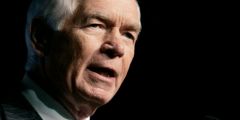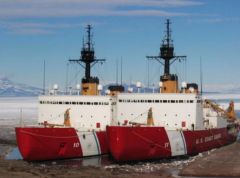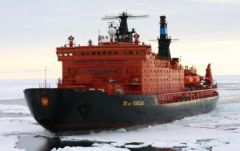What melting Arctic? US defense bill includes one billion dollars to fund a new polar icebreaker
The U.S. Senate Appropriations Committee’s Defense Appropriations Bill has included one billion dollars in funding to accelerate construction of a new polar icebreaker for the U.S. Coast Guard, reported Senator Thad Cochran (R-Miss.).
Cochran, who chairs the Senate Defense Appropriations Subcommittee, said the bill recommends $1 billion in Navy shipbuilding funds to procure the first U.S. Coast Guard-operated icebreaker in more than 25 years. Congress last funded a new icebreaker in the 1990 Defense Appropriations Act.
The U.S. currently relies on just two polar icebreakers, one heavy and one medium vessel. The heavy icebreaker, Polar Star, entered service in 1976 and is well beyond its 30-year service life. In contrast, the Russian fleet consists of roughly 40 operational icebreakers and 11 icebreakers either planned or under construction.
“Our FY2017 defense funding bill makes a critical investment in the long-delayed expansion of the U.S. icebreaker fleet,” Cochran said. “We must take assertive action to provide the vessels needed to protect American national security and economic interests in the Arctic region. The United States needs the capability to have year-round access to Polar Regions.”
The funding for the Polar Icebreaker Recapitalization Project would accelerate plans announced by President Obama last year to shift planned icebreaker construction from 2022 to 2020. In addition to funding, language in the bill would encourage actions to facilitate an earlier construction start and long-range cost savings.
…
New Fed Report is ‘surprising’: Melting Alaska may not accelerate climate change as expected, scientists now say
WASHINGTON — The results of new research released by the U.S. Geological Survey have surprised scientists: Alaska is not likely to emit as much carbon this century as they’d previously expected.
The report marks the first statewide inventory of natural sources of carbon emissions and carbon storage. The research has been in the works since 2012, as part of a nationwide effort by USGS to examine carbon storage.
Also for the first time, scientists considered different water bodies such as lakes and wetlands separately, to avoid double-counting. The report relied on as much new field data as possible, collected by scientists from USGS, the Forest Service and Alaska universities, said USGS scientist and report author Zhiliang Zhu.
The results could reassure many who worry that the impacts of already-occurring climate change in Alaska could compromise efforts to curb greenhouse gas emissions.
In recent years, scientists have sounded the alarm on the climate change implications of Alaska’s melting permafrost, the frozen layer of soil and rock that covers from one-third to two-thirds of the state. As it melts — far faster than once expected — it releases methane, which is an extremely potent greenhouse gas. And thus, climate change in the Arctic begets more climate change.
But the new peer-reviewed government report released Wednesday found that may not be the case, at least through the year 2100.
“I think it was surprising to us … but it’s not inconsistent with global analyses that have been conducted for the permafrost region,” said Dave McGuire, one of the report’s authors.
That’s partly because the simulation models showed more growth than the scientists expected, and partly because the research was able to draw a more explicit line between the permafrost thaw and the amount of carbon exposed, McGuire said. More than 90 percent of Alaska’s total carbon stock is stored in permafrost, according to the USGS.
The report is a big deal because it provides a benchmark for policymakers making plans for managing climate change, with new information on how Alaska may impact those plans, McGuire said. Global climate plans require such information to inform the timing of greenhouse-gas reduction goals, he said, comparing it to planning a retirement budget and taking unknown future costs into account.
Additionally, the report found that forests in Southeast Alaska will capture more carbon going forward, though it is only a small region of the state.
The
ALERT: Landmark California bill would allow prosecution of climate-change skeptics
A landmark California bill gaining steam would make it illegal to engage in climate-change dissent, clearing the way for lawsuits against fossil-fuel companies, think-tanks and others that have “deceived or misled the public on the risks of climate change.”
The first-of-its-kind legislation — Senate Bill 1161, or the California Climate Science Truth and Accountability Act of 2016 — is scheduled for floor action Thursday after clearing Senate committees in April and May.
The measure would allow state and local prosecutors to pursue claims against climate-change skepticism as a violation of the state’s Unfair Competition Law [UCL], as well as extend the four-year statute of limitations for such claims retroactively to Jan. 1, 2021.
“This bill explicitly authorizes district attorneys and the Attorney General to pursue UCL claims alleging that a business or organization has directly or indirectly engaged in unfair competition with respect to scientific evidence regarding the existence, extent, or current or future impacts of anthropogenic induced climate change,” says the state Senate Rules Committee’s floor analysis.
While the measure enjoys broad support by a bevy of environmental groups, the bill has also been described as an effort to ban free speech on climate change as well as chill donations to free-market groups.
Stephen Frank, editor of the conservative California Political Review, called the bill a “totalitarian statement by Democrats that the First Amendment is now dead.”
“Did you donate to the Pacific Legal Foundation? Do you support Americans for Prosperity? Are you a member of the California Republican Party, which has a platform approving of all forms of energy, including fossil fuel (oil)? Do you work for a gas station, an oil company, have your written a letter to the editor in favor of oil drilling?” asked Mr. Frank in a May 31 post.
“If so, you could find yourself with being charged in a court of law, thanks to SB 1161,” Mr. Frank said.
California Attorney General Kamala Harris belongs to a coalition of 17 state attorneys general that joined forces in March to pursue climate-change skeptics, starting with ExxonMobil.
The floor analysis cites as a rationale for the bill articles published last year by InsideClimate News and the Columbia Journalism School’s Energy and Environmental Reporting Project accusing ExxonMobil of hiding its research on climate change, which the company has denied.
“By extending the
The planet cools as El Niño disappears
…Analysis: Warmist Naomi Oreskes ‘Warps History’
Harvard historian of science Naomi Oreskes is best known to climate realists by her 2010 book,Merchants of Doubt and its scurrilous demonization of climate skeptics as paid hacks parroting the fossil-fuel industry’s self-serving opposition to the “consensus view” of man-made climate catastrophe, but that screed doesn’t reveal the flaws in her work.
A short, obscure, error-riddled essay titled, “My Science is Better than Your Science,” that she wrote in 2011 is more significant. It was a chapter in a book titled, How Well Do Facts Travel? The Dissemination of Reliable Knowledge, and examined the 1991 origin of the “skeptics are paid industry shills” narrative supposedly found in a legendary set of “leaked Western Fuels memos.”
That short chapter is important because Oreskes totally misinterprets the “memos” as Big Coal’s plan for a vast national campaign with paid climate scientists that created the lasting public doubt about global warming. That’s the very same interpretation repeated endlessly by climate alarmists including Al Gore, Ross Gelbspan (1997’s The Heat Is On), Canadian public relations flak James Hoggan ’s attack website DeSmogBlog, and many others.
Appallingly, nobody in this parade of critics did any fact checking of the memos, not even historian Naomi Oreskes, which is a serious lapse for a historian. In fact, Oreskes and the others were using a garbled conglomeration of nearly a dozen different memos from different sources that were collected by Greenpeace and posted unsorted and in no rational order on one of its websites – because they never checked who they really came from.
Critics had no idea what they were looking at in the hundred-or-so pages of “Western Fuels memos.” They simply took the pieces that made skeptics look the worst and patched them together into an assumption-laden fairy-tale, historian Oreskes most unseemly of all.
Had Oreskes, the renowned Harvard Professor of the History of Science, bothered to interview any of the clearly identified sources of the “Western Fuels memos,” she would have discovered that less than one-third of the jumbled “memos” involved Western Fuels Association at all.
It’s ironic that the “Western Fuels memos” became known as “Orders from Big Coal” because Western Fuels Association is actually just the opposite of what the alarmist critics thought: It’s a small, not-for-profit, member-owned co-op serving 24 consumer-owned rural and small municipal electric cooperatives and other public power systems from Wyoming to Kansas. Oreskes never mentions …
FEAR-Mongering Newspaper Warns PART of Antarctic Is Losing Ice (But Total Ice Is Up)
…Kerry: If Trump pulled U.S. out of UN climate deal ‘it would be an act of extraordinary danger to our country’
Secretary of State John Kerry lambasted any future president who would tear up the international climate agreement the U.S. signed in April.
“Ripping up the climate agreement that was reached in Paris would be reckless, counterproductive, self-destructive,” Kerry told MSNBC host Chris Hayes on Wednesday.
“It would be an act of extraordinary danger to our country because of the path it would put us on both in terms of our global leadership on the issue as well as the actual policies we need to implement and it would in the end be an act of ignorance, of utter unbelievable contemptuous ignorance to get rid of something that the world has worked for since 1992 in Rio,” Kerry continued.
The attack was an indirect warning for Donald Trump, who last week promised to back out of the accord if elected president.…
Bloomberg journalist: ‘Global-Warming Alarmists, You’re Doing It Wrong’ – Arguments ‘sound more like theology than science’
This lesson from economics is essentially what the “lukewarmists” bring to discussions about climate change. They concede that all else equal, more carbon dioxide will cause the climate to warm. But, they say that warming is likely to be mild unless you use a model which assumes large positive feedback effects. Because climate scientists, like the macroeconomists, can’t run experiments where they test one variable at a time, predictions of feedback effects involve a lot of theory and guesswork. I do not denigrate theory and guesswork; they are a vital part of advancing the sum of human knowledge. But when you’re relying on theory and guesswork, you always want to leave plenty of room for the possibility that your model’s output is (how shall I put this?) … wrong.
Naturally, proponents of climate-change models have welcomed the lukewarmists’ constructive input by carefully considering their points and by advancing counterarguments firmly couched in the scientific method.
No, of course I’m just kidding. The reaction to these mild assertions is often to brand the lukewarmists “deniers” and treat them as if what they were saying was morally and logically equivalent to suggesting that the Holocaust never happened.
…
Nor has the presumed object of this name calling — to delegitimize thoughtful opposition, and thereby increase the consensus in favor of desired policy proposals — been a notable political success, at least in the U.S. It has certainly rallied the tribe, and produced a lot of patronizing talk about science by people who aren’t actually all that familiar with the underlying scientific questions. Other than that, we remain pretty much where we were 25 years ago: holding summits, followed by the dismayed realization that we haven’t, you know, really done all that much except burn a lot of hydrocarbons flying people to summits.
Maybe last year’s Paris talks will turn out to be the actual moment when things started to change — but having spent the last 15 years as a reporter listening to people tell me that no, really, we’re about to turn the corner, I retain a bit of skepticism.…



